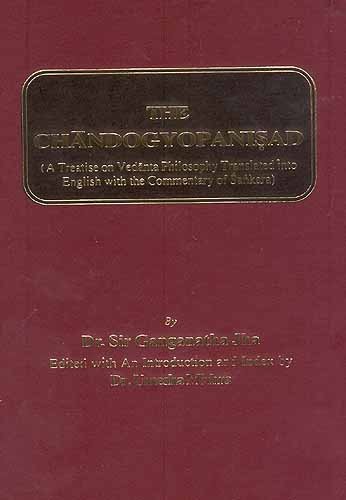Chandogya Upanishad (Shankara Bhashya)
by Ganganatha Jha | 1942 | 149,749 words | ISBN-10: 8170842840 | ISBN-13: 9788170842842
This is the English translation of the Chandogya Upanishad, an ancient philosophical text originally written in Sanksrit and dating to at least the 8th century BCE. Having eight chapters (adhyayas) and many sub-sections (khandas), this text is counted among the largest of it's kind. The Chandogya Upanishad, being connected to the Samaveda, represen...
Section 1.12 (twelfth khaṇḍa) (five texts)
Upaniṣad text:
Now, then, the Udgītha connected with dogs. Baka-Dālbhya or Glāva Maitreya went out for Vedic study.—(1)
Commentary (Śaṅkara Bhāṣya):
In the foregoing Section, the Text has described the deplorable state to which one is reduced for want of food,—the state represented by the necessity of eating stale and unclean food. In order to avoid such a condition, one has to obtain food, and to that end, the Text proceeds now with the Udgītha connected with dogs: that is, the chanting, the Sāma, perceived by (revealed to) Dogs.—As regards this, Baka, by name, the son of Dalbha who was also Glāva the son of Mitra;—the particle ‘vā’ has the sense of ‘ca’: the sense, therefore, is that only one person is mentioned, who was a Dvyāmuṣyāyaṇa, born of two families (one by birth and another by adoption); the text cannot be taken as mentioning two alternative names, because there can be no option as between things, as there is between actions. The Smṛti speaks of persons ‘having two names, and belonging to two gotras’; it is also found that such persons are recipients of offerings from both families.—Or, it may be that the Text was engrossed with the main subject of Udgītha and hence did not care whether it was speaking of one or two or more sages; and the particle ‘vā’ is meant only to facilitate the recital of the text.
For the purposes of Vedic study the said sage went out to a place outside the village, to a quiet place near a river. He went out and waited there;—the singular number in the verb ‘udvabrāja’ (went out) clearly indicates that the sage in question was one only (bearing the two names).—The sense appears to be that, inasmuch as the sage awaited the Udgītha connected with Dogs, it would seem as if his Vedic study was for the purpose of obtaining food.—(1)
Upaniṣad text:
A white dog appeared before him; and other dogs, gathering round that Dog, said—“Sir, please sing food for us; really we are hungry.”—(2)
Commentary (Śaṅkara Bhāṣya):
Being pleased with the learning (of Baka—Dālbhya) a deity, or a sage, took the shape of the dog, and thus was it that a white dog appeared—i.e. was made to appear—before him—i.e. for the purpose of bestowing a favour upon him. Other dogs—smaller ones—gathering round that dog,—said to him—“Sir, please sing food for us,—i.e. secure food for us by means of singing.” The right meaning to be deduced from all this is that Speech and the rest, being partakers of food “in the wake of Breath”, said this to the Breath in the Mouth; the idea being that being pleased with Vedic learning, they would help the Breath through their own forms.—“Really we are hungry.”—(2)
Upaniṣad text:
He said to them—“Meet me here in the morning.” Baka-Dālbhya or Glāva-Maitreya awaited (their reappearance).—(3)
Commentary (Śaṅkara Bhāṣya):
Being thus addressed, the white Dog said to the smaller dogs—“Here,—at this same place,—meet me in the morning.” The long Vowel in ‘Samīyāta’ is a Vedic anomaly; or it may be a wrong reading. The appointment of the morning is meant to show that what he was going to do should be best done in the morning; because the Sun, who is the bestower of food, is not quite before us in the afternoon.—There the sage, Baka-Dālbhya or Glāva-Maitreya awaited,—waited for their re-appearance.—(3)
Upaniṣad text:
Just as the men who are going to sing the Bahiṣpavamāna hymn move round linked to each Other, in the same manner did the smaller dogs move round; having sat down, they uttered the syllable ‘Hiṃ’.—(4)
Commentary (Śaṅkara Bhāṣya):
Those dogs having come to the place, moved round, in the presence of the sage; just as the??en [men?], the assistants of the Udgātṛ-Priest, who are going to sing the Bahiṣpavamāna Hymn linked to each other, so the dogs moved round, each holding in his mouth the tail of the other;—and having thus moved round, they sat down, and being seated, they uttered the syllable ‘Hiṃ’.—(4)
Upaniṣad text:
‘Om ! Let us eat! Om! Let us drink! Om! May the Deva, Varuṇa, Prajāpati, Savitṛ bring us food! O, Lord of Food, bring here food; yea, bring it.’—(5)
Commentary (Śaṅkara Bhāṣya):
Om, let us eat! Om, let us drink.—Deva, the Sun is so called because He shines; He is Varuṇa, because He brings rain to the world;—He is Prajāpati, because he nourishes the people;—He is Savitṛ, because he is the progenitor of all things.—It is the Sun who is addressed by these synonymous terms. May the Sun who is all this, bring us food.—Having done this, they said again—“O Lord of Food,—He is called the ‘Lord’ of Food, because it is He who produces all food; in the sense that without the ripening due to the Sun, not much food is produced, even to the smallest degree, for living beings; hence he is called the ‘Lord of Food’.—O Lord of Food! bring here food— for us—yea, bring it;—the repetition is meant to indicate the importance of the subject Om.—(5)
End of Section (12) of Discourse 1
